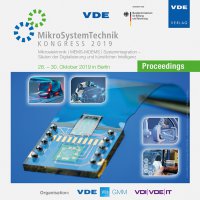Numerical Investigation of Anodic Bonding for Stress Sensitive MEMS Device
Konferenz: MikroSystemTechnik 2019 - Kongress
28.10.2019 - 30.10.2019 in Berlin, Deutschland
Tagungsband: MikroSystemTechnik 2019
Seiten: 4Sprache: EnglischTyp: PDF
Persönliche VDE-Mitglieder erhalten auf diesen Artikel 10% Rabatt
Autoren:
Hu, Xiaodong (Hochschule für Technik und Wirtschaft Berlin (HTW), Germany & MSG Lithoglas GmbH, Germany)
Schiffer, Michael (Fraunhofer Institut für Zuverlässigkeit und Mikrointegration (IZM), Germany)
Schneider-Ramelow, Martin; Lang, Klaus-Dieter (Fraunhofer Institut für Zuverlässigkeit und Mikrointegration (IZM), Germany & Technische Universität Berlin, Germany)
Inhalt:
This paper is to investigate the influence of the bonding temperature and material properties on anodic bonding and the thermally introduced stress. Anodic bonding technology is widely used to form bond between borosilicate glass and bare MEMS sensors to realize application specialized structure, such as complex 3D structure, hermetic environment and fluid tunnels. However, this technique will introduce thermal stress, which is caused by different CTEs between silicon and glass, and the effect of this stress have not been well studied yet. From this point of view, this Paper concentrates on the stress issue and its influences on the MEMS-based sensors. A MEMS pressure sensor with two different encapsulation materials was simulated and fabricated and bonded to evaluate the anodic bond stress effect. The two materials were thinglass-layer, which was deposited on a well-designed silicon interposer wafer using bulk micromachine technology, and SW-YY(r), which has a CTE that is very similar to silicon. The chip performance of both proposed concepts were then tested using electrical measurement.


